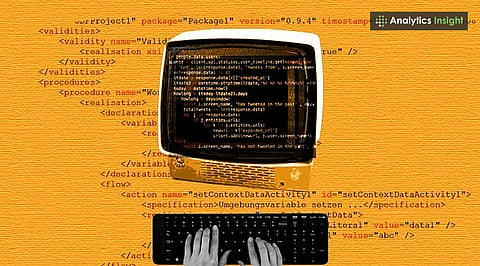

Web3 relies on specialized programming languages designed for smart contracts, security, and scalability.
Solidity, Rust, and Go are among the most in-demand languages for blockchain-based projects.
Learning these languages can open career opportunities in decentralized applications, NFTs, and crypto ecosystems.
Web3 is changing how the internet works, giving regular people more say instead of giant corporations, through technologies such as blockchain, dApps, and smart contracts. So, if you plan to create things for this web's future, you'll need to know proper programming languages.
Some are suitable for smart contracts, while others are better suited for security, scaling, or app creation. The Top 10 Programming Languages for Web3 Development are shaping how decentralized apps are built.
Many developers are eager to master Web3 Programming Languages for better opportunities in blockchain projects. Solidity is the primary language for Web3. It's used to create smart contracts on Ethereum, which remains the primary platform for most dApps.
If you know JavaScript, you'll quickly pick up Solidity. It's still super crucial because Ethereum is where most DeFi and NFT projects live.
Also Read: How to Learn JavaScript from Scratch: Step-by-Step Guide
Choosing the Best Blockchain Languages can significantly impact the scalability and security of applications. Rust has gained significant popularity for blockchain applications due to its speed and security.
It's the engine behind fast blockchains like Solana and Polkadot. Developers are interested in it 'cause it helps catch errors and keeps smart contracts secure. Going into 2025, Rust is a valuable skill if you are looking for a Web3 job.
Go is widely used for building blockchain applications behind the scenes. It's the language behind Hyperledger Fabric and plays a part in Ethereum as well. It's easy to use, efficient, and can handle multiple tasks simultaneously, making it ideal for large blockchain networks. Many companies choose Go for their backend blockchain systems.
Smart Contract Development remains at the heart of decentralized finance and NFT platforms. Python may not be the first language that comes to mind for blockchain, but it still works. It's simple to read, which helps people build quick prototypes and tools for blockchain.
Additionally, it features libraries, which simplify the process of building blockchain apps. Because many people use Python, it’s pretty useful for testing, automation, and cryptocurrency trading bots.
You still need to know JavaScript for Web3-related tasks. Most dApps require a front-end, and JavaScript connects websites to the blockchain using libraries such as Web3.js and Ethers.js.
The Future of Web3 Coding promises more efficient frameworks and greater adoption worldwide. People often use it in conjunction with Solidity, so your dApp features smart contracts and a straightforward interface for users to interact with it. It will remain crucial for Web3 coders.
C++ has been around for a long time, and it remains relevant in blockchain. Bitcoin was built using C++. Due to its functionality, it's a suitable choice for developing blockchain protocols and wallets. If you know C++, you can work on the basic building blocks of Web3 projects.
Java is a classic language that remains a significant player in blockchain. People use it to create apps that work on all kinds of devices, and it's renowned for being extremely reliable.
Blockchains like NEO use Java for smart contracts and dApp development. Because it has been around, it's generally a safe bet for Web3 development.
Vyper's a fresh take on languages for Ethereum smart contracts, similar to Solidity. It really emphasizes safety and simplicity. It skips some of Solidity's more advanced features, which actually helps reduce potential issues. If you're building dApps and seriously care about security, Vyper is worth checking out.
C# is widely used for game development, but it also lends itself to blockchain applications. The Stratis blockchain platform enables you to build smart contracts using C#. It's helpful if you want to make blockchain-based apps for businesses or games. Since Microsoft supports it, it's pretty reliable.
Haskell is a programming language known for its precision. It's not as popular as Solidity or Rust right now, but it's the go-to language that runs Cardano, a major blockchain project.
If you want to work with Cardano projects, you'll want to learn Haskell. It's not the easiest language to learn, but its accuracy makes it worth it.
Also Read: Top Mistakes Beginners Make When Learning AI for Development
Web3 is evolving rapidly, and developers with the right skills are driving this change. Solidity, Rust, and Go remain prominent in blockchain, but Vyper, Java, and Python can also be beneficial.
Each does its own thing best, such as developing smart contracts or building blockchains. Get a handle on a couple, and you'll be set for jobs and cool projects in the crypto world in 2025.
1. Which programming language is most used in Web3?
Solidity is the most widely used language for Web3 smart contracts on Ethereum.
2. Why is Rust prevalent in blockchain development?
Rust is popular because it offers high speed, security, and reliability for Web3 apps.
3. Can JavaScript be used in Web3 development?
Yes, JavaScript is used to build front-end decentralized applications (dApps) and connect them to blockchains.
4. Is Python good for blockchain development?
Python is well-suited for creating prototypes, tools, and scripts for blockchain automation.
5. Which blockchain uses Haskell?
Cardano utilizes Haskell as its primary programming language for smart contracts and blockchain logic.
